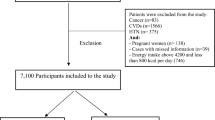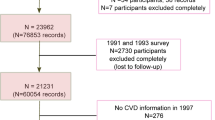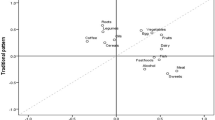Abstract
A plant-based dietary pattern has been recommended for its potential health and environmental benefits, but its relation to mortality warrants further exploration1. We examined this association among 13,154 adults aged 65 years and older (57.4% female) in the Chinese Longitudinal Healthy Longevity Survey (CLHLS). The overall plant-based diet index (PDI), healthful plant-based diet index (hPDI) and unhealthful plant-based diet index (uPDI) were calculated using dietary data collected by a simplified food frequency questionnaire (FFQ). Compared with the lowest quintile, participants in the highest quintile of PDI and hPDI had a decreased risk of all-cause mortality (hazard ratio (HR) = 0.92; 95% confidence interval (CI) 0.86, 0.98 for PDI; HR = 0.81, 95% CI, 0.76, 0.87 for hPDI), whereas participants with the highest uPDI scores had a 17% (95% CI, 9%, 26%) increased risk. Among plant foods, fresh fruits, fresh vegetables, legumes, garlic, nuts and tea were the main protective contributors, whereas preserved vegetables and sugar were associated with a higher risk of mortality. These findings support the beneficial roles of overall and healthful plant-based dietary patterns. The quality, and not only quantity, of plant foods should be emphasized in relevant public health recommendations.
This is a preview of subscription content, access via your institution
Access options
Access Nature and 54 other Nature Portfolio journals
Get Nature+, our best-value online-access subscription
$29.99 / 30 days
cancel any time
Subscribe to this journal
Receive 12 digital issues and online access to articles
$119.00 per year
only $9.92 per issue
Buy this article
- Purchase on Springer Link
- Instant access to full article PDF
Prices may be subject to local taxes which are calculated during checkout


Similar content being viewed by others
Data availability
Data described in this paper are stored in the Peking University Open Research Data Platform, a public data repository (https://opendata.pku.edu.cn/dataset.xhtml?persistentId=doi:10.18170/DVN/WBO7LK).
Code availability
The code scripts used in this analysis are available from the corresponding authors upon reasonable request.
References
Soultoukis, G. A. & Partridge, L. Dietary protein, metabolism, and aging. Annu. Rev. Biochem. 85, 5–34 (2016).
GBD 2019 Risk Factors Collaborators Global burden of 87 risk factors in 204 countries and territories, 1990-2019: a systematic analysis for the Global Burden of Disease Study 2019. Lancet 396, 1223–1249 (2020).
English, L. K. et al. Evaluation of dietary patterns and all-cause mortality: a systematic review. JAMA Netw. Open 4, e2122277 (2021).
Schulze, M. B., Martínez-González, M. A., Fung, T. T., Lichtenstein, A. H. & Forouhi, N. G. Food based dietary patterns and chronic disease prevention. BMJ 361, k2396 (2018).
Sofi, F., Cesari, F., Abbate, R., Gensini, G. F. & Casini, A. Adherence to Mediterranean diet and health status: meta-analysis. BMJ 337, a1344 (2008).
Kheirouri, S. & Alizadeh, M. MIND diet and cognitive performance in older adults: a systematic review. Crit. Rev. Food Sci. Nutr. 14, 1–19 (2021).
Sacks, F. M. et al. Effects on blood pressure of reduced dietary sodium and the dietary approaches to stop hypertension (DASH) diet. DASH-Sodium Collaborative Research Group. N. Engl. J. Med. 344, 3–10 (2001).
Hemler, E. C. & Hu, F. B. Plant-based diets for personal, population, and planetary health. Adv. Nutr. 10, S275–S283 (2019).
Hall, K. D. et al. Effect of a plant-based, low-fat diet versus an animal-based, ketogenic diet on ad libitum energy intake. Nat. Med. 27, 344–353 (2021).
Baden, M. Y. et al. Changes in plant-based diet quality and total and cause-specific mortality. Circulation 140, 979–991 (2019).
Satija, A. et al. Changes in intake of plant-based diets and weight change: results from 3 prospective cohort studies. Am. J. Clin. Nutr. 110, 574–582 (2019).
Satija, A. et al. Plant-based dietary patterns and incidence of type 2 diabetes in US men and women: results from three prospective cohort studies. PLoS Med. 13, e1002039 (2016).
Satija, A. et al. Healthful and unhealthful plant-based diets and the risk of coronary heart disease in U.S. adults. J. Am. Coll. Cardiol. 70, 411–422 (2017).
Kim, H. et al. Operational differences in plant-based diet indices affect the ability to detect associations with incident hypertension in middle-aged US adults. J. Nutr. 150, 842–850 (2020).
Keaver, L. et al. Plant- and animal-based diet quality and mortality among US adults: a cohort study. Br. J. Nutr. 125, 1405–1415 (2020).
Kim, H. et al. Plant-based diets are associated with a lower risk of incident cardiovascular disease, cardiovascular disease mortality, and all-cause mortality in a general population of middle-aged adults. J. Am. Heart Assoc. 8, e012865 (2019).
Kim, H., Caulfield, L. E. & Rebholz, C. M. Healthy plant-based diets are associated with lower risk of all-cause mortality in US adults. J. Nutr. 148, 624–631 (2018).
Martínez-González, M. A. et al. A provegetarian food pattern and reduction in total mortality in the Prevención con Dieta Mediterránea (PREDIMED) study. Am. J. Clin. Nutr. 100, 320s–328s (2014).
Kim, J., Kim, H. & Giovannucci, E. L. Plant-based diet quality and the risk of total and disease-specific mortality: a population-based prospective study. Clin Nutr 40, 5718–5725 (2021).
Schwingshackl, L. et al. Food groups and risk of all-cause mortality: a systematic review and meta-analysis of prospective studies. Am. J. Clin. Nutr. 105, 1462–1473 (2017).
Aune, D. et al. Fruit and vegetable intake and the risk of cardiovascular disease, total cancer and all-cause mortality-a systematic review and dose-response meta-analysis of prospective studies. Int. J. Epidemiol. 46, 1029–1056 (2017).
Luo, C. et al. Nut consumption and risk of type 2 diabetes, cardiovascular disease, and all-cause mortality: a systematic review and meta-analysis. Am. J. Clin. Nutr. 100, 256–269 (2014).
Zhang, C. et al. Tea consumption and risk of cardiovascular outcomes and total mortality: a systematic review and meta-analysis of prospective observational studies. Eur J Epidemiol 30, 103–113 (2015).
Ramne, S. et al. Association between added sugar intake and mortality is nonlinear and dependent on sugar source in 2 Swedish population-based prospective cohorts. Am. J. Clin. Nutr. 109, 411–423 (2019).
Wang, X. et al. Red and processed meat consumption and mortality: dose-response meta-analysis of prospective cohort studies. Public Health Nutr. 19, 893–905 (2016).
Theuma, P. & Fonseca, V. A. Inflammation and emerging risk factors in diabetes mellitus and atherosclerosis. Curr. Diab. Rep. 3, 248–254 (2003).
Ma, Y. et al. Association between dietary fiber and markers of systemic inflammation in the Women’s Health Initiative Observational Study. Nutrition 24, 941–949 (2008).
Cassidy, A. et al. Higher dietary anthocyanin and flavonol intakes are associated with anti-inflammatory effects in a population of US adults. Am. J. Clin. Nutr. 102, 172–181 (2015).
Tran, E., Dale, H. F., Jensen, C. & Lied, G. A. Effects of plant-based diets on weight status: a systematic review. Diabetes Metab. Syndr. Obes. 13, 3433–3448 (2020).
Najjar, R. S. & Feresin, R. G. Plant-based diets in the reduction of body fat: physiological effects and biochemical insights. Nutrients 11, 2712 (2019).
Pearson, T. A. et al. Markers of inflammation and cardiovascular disease: application to clinical and public health practice: A statement for healthcare professionals from the Centers for Disease Control and Prevention and the American Heart Association. Circulation 107, 499–511 (2003).
Soltani, S., Jayedi, A., Shab-Bidar, S., Becerra-Tomás, N. & Salas-Salvadó, J. Adherence to the Mediterranean diet in relation to all-cause mortality: a systematic review and dose-response meta-analysis of prospective cohort studies. Adv. Nutr. 10, 1029–1039 (2019).
Akbaraly, T. N. et al. Alternative Healthy Eating Index and mortality over 18 y of follow-up: results from the Whitehall II cohort. Am. J. Clin. Nutr. 94, 247–253 (2011).
Mokhtari, Z. et al. Adherence to the Dietary Approaches to Stop Hypertension (DASH) diet and risk of total and cause-specific mortality: results from the Golestan Cohort Study. Int. J. Epidemiol. 48, 1824–1838 (2019).
He, Y. et al. The dietary transition and its association with cardiometabolic mortality among Chinese adults, 1982-2012: a cross-sectional population-based study. Lancet Diabetes Endocrinol. 7, 540–548 (2019).
Tilman, D. & Clark, M. Global diets link environmental sustainability and human health. Nature 515, 518–522 (2014).
Pimentel, D. & Pimentel, M. Sustainability of meat-based and plant-based diets and the environment. Am. J. Clin. Nutr. 78, 660s–663s (2003).
Tjonneland, A. et al. Influence of individually estimated portion size data on the validity of a semiquantitative food frequency questionnaire. Int. J. Epidemiol. 21, 770–777 (1992).
Yuan, C., Lee, H. J., Shin, H. J., Stampfer, M. J. & Cho, E. Fruit and vegetable consumption and hypertriglyceridemia: Korean National Health and Nutrition Examination Surveys (KNHANES) 2007-2009. Eur. J. Clin. Nutr. 69, 1193–1199 (2015).
Zeng, Y. in Healthy Longevity in China: Demographic, Aocioeconomic, and Psychological Dimensions. Vol. 20 (eds Y. Zeng, L. P. Dudley, A. V. Denese & G. Danan) 23–38 (Springer, 2008).
Zhao, W., Hasegawa, K. & Chen, J. The use of food-frequency questionnaires for various purposes in China. Public Health Nutr. 5, 829–833 (2002).
Jin, X. et al. Association of APOE ε4 genotype and lifestyle with cognitive function among Chinese adults aged 80 years and older: a cross-sectional study. PLoS Med. 18, e1003597 (2021).
Zhang, Y. et al. Interaction between APOE ε4 and dietary protein intake on cognitive decline: a longitudinal cohort study. Clin. Nutr. 40, 2716–2725 (2021).
Wang, Z. et al. Association of healthy lifestyle with cognitive function among Chinese older adults. Eur. J. Clin. Nutr. 75, 325–334 (2021).
Liu, D. et al. Association of dietary diversity changes and mortality among older people: a prospective cohort study. Clin. Nutr. 40, 2620–2629 (2021).
Stockwell, T. et al. Do “moderate” drinkers have reduced mortality risk? A systematic review and meta-analysis of alcohol consumption and all-cause mortality. J. Stud. Alcohol Drugs 77, 185–198 (2016).
David, S. Partial residuals for the proportional hazards regression model. Biometrika 69, 239–241 (1982).
Acknowledgements
This work was supported by Fundamental Research Funds from the Central Universities of Zhejiang University (X.W. and C. Y.). The collection of the CLHLS datasets analyzed in this paper was jointly supported by the National Key R&D Program of China (2018YFC2000400), the National Natural Sciences Foundation of China (72061137004), the National Institute on Aging of the National Institutes of Health (P01AG031719) and Duke/Duke-NUS (grant RECA(Pilot)/2019/0051 to Y. Z.). The funders had no role in study design, data collection, analysis, decision to publish or manuscript preparation. We are grateful to all cooperating organizations and their staff during the CLHLS, whose hard work made this study possible. We thank the interviewees and their families for their voluntary participation in the CLHLS.
Author information
Authors and Affiliations
Contributions
C.Y., J.S.J., X.W., and H.C. designed the analysis; H.C. and A.Z. performed the statistical analyses; J.S., J.X., X.W., and X.L. interpreted the data; J.S. and H.C. drafted the manuscript; X.L., Y.C., X.W. and G.Z. critically reviewed and revised the manuscript; Y.Z. designed and administered the original CLHLS; C.Y. and X.W. supervised the data analysis and interpretation; and C.Y. had primary responsibility for the final content. All authors approved the final draft.
Corresponding authors
Ethics declarations
Competing interests
The authors have no competing interests.
Peer review
Peer review information
Nature Aging thanks Zhangling Chen, Shankar Viswanathan and Paul Jacques for their contribution to the peer review of this work.
Additional information
Publisher’s note Springer Nature remains neutral with regard to jurisdictional claims in published maps and institutional affiliations.
Extended data figures and tables
Extended Data Fig. 1 The pairwise Spearman correlation coefficient between different food groups.
Pairwise Spearman correlation coefficients were presented.
Extended Data Fig. 2 Flow chart of participant inclusion.
Of a total of 16954 participants, 13154 eligible participants were included in the final analysis.
Supplementary information
Supplementary Information
Supplementary Tables 1–10.
Source data
Source Data Fig. 1
Source data for Fig. 1.
Source Data Fig. 2
Source data for Fig. 2.
Extended Data Fig. 1
Source data for Extended Data Fig. 1.
Rights and permissions
About this article
Cite this article
Chen, H., Shen, J., Xuan, J. et al. Plant-based dietary patterns in relation to mortality among older adults in China. Nat Aging 2, 224–230 (2022). https://doi.org/10.1038/s43587-022-00180-5
Received:
Accepted:
Published:
Issue Date:
DOI: https://doi.org/10.1038/s43587-022-00180-5
This article is cited by
-
Associations between plant-based dietary patterns and risks of type 2 diabetes, cardiovascular disease, cancer, and mortality – a systematic review and meta-analysis
Nutrition Journal (2023)
-
Ethnobotanical study on edible flowers in Xishuangbanna, China
Journal of Ethnobiology and Ethnomedicine (2023)
-
Association between plant-based dietary pattern and biological aging trajectory in a large prospective cohort
BMC Medicine (2023)
-
Promotion of Healthy Lifestyles Alone Might Not Substantially Reduce Socioeconomic Inequity-Related Mortality Risk in Older People in China: A Prospective Cohort Study
Journal of Epidemiology and Global Health (2023)
-
Association of plant-based dietary patterns with the risk of osteoporosis in community-dwelling adults over 60 years: a cross-sectional study
Osteoporosis International (2023)



